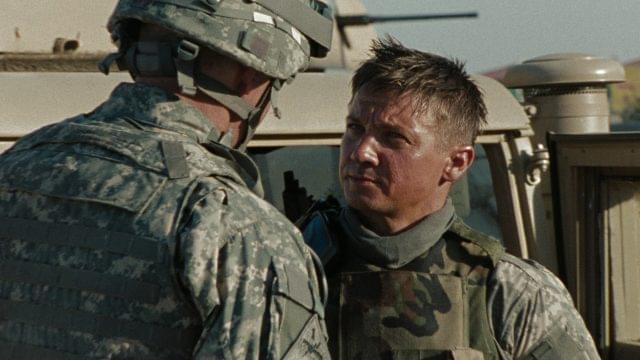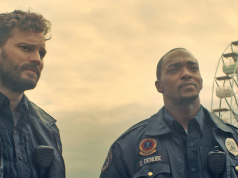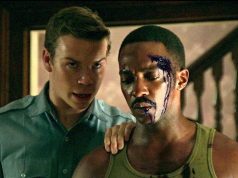
It’s not hard to suss out the message of “The Hurt Locker,” as it begins with this quotation from New York Times war correspondent Chris Hedges: “The rush of battle is a potent and often lethal addiction, for war is a drug.” Then, just to be sure, all the words except “WAR IS A DRUG” fade from the screen.
That’s the only un-subtle moment in Kathryn Bigelow’s otherwise sharp film, a tight, suspenseful action drama that happens to be set in Baghdad in 2004. Like almost every film about the Iraq War, “The Hurt Locker” is about war in general, not this specific one, and even at that it’s as much about the mechanics of battle as the psychology of it. It’s a film about a squad of bomb technicians, the men who have to decide whether to cut the red wire or the blue wire. Even a semi-competent filmmaker could turn that into something entertaining, and Bigelow — director of such masculine films as “Point Break,” “Strange Days,” and “K-19: The Widowmaker” — takes it further, adding haunting emotional resonance to the surface-level thrills.
Written by Mark Boal, a journalist whose reporting became the basis for “In the Valley of Elah” (another Iraq film), “The Hurt Locker” concerns a three-man Explosive Ordnance Disposal (EOD) unit in the U.S. Army that’s led by a brash young staff sergeant named William James (Jeremy Renner). James is new to the company but already a veteran of Afghanistan and other Iraq operations, and he is so familiar with the protocols meant to ensure safety — well, to minimize the chance of death, anyway — that he feels comfortable ignoring them.
This is alarming to Sgt. J.T. Sanborn (Anthony Mackie), his next in command. The film shrewdly begins, prior to James’ arrival, with an intense bomb-defusing scene that serves the dual purpose of being extremely dramatic and showing us how the procedure is supposed to be done. Sanborn is a stickler for the common-sense details of assisting a fellow specialist through a potentially deadly situation (the way you might be a “stickler” for keeping your eyes open when you drive), and is furious when James disregards them. The third member of the team, Specialist Owen Eldridge (Brian Geraghty), is reeling from a fellow soldier’s death that he believes he could have prevented if he had acted more decisively.
It’s not that James is foolish, though. A man doesn’t live through as many IED-defusings as he has without knowing what he’s doing. For him, the experience is a rush. Why send a remote-controlled robot to investigate a possible explosive device when you can saunter over and check it out yourself? James derives a thrill from discovering exactly how much potential devastation he’s up against, exhilarated not because he takes it lightly but precisely because he doesn’t take it lightly. When he opens a car trunk to reveal a huge, complicated bomb, his reaction of “Oh, God” reflects not excitement but genuine terror — and that’s what he loves. When each mission is over, he immediately lights a cigarette, as if having enjoyed a satisfying sexual encounter. In one instance he even says, “That was good.”
Over time, James, Sanborn, and Eldridge come to understand one another, mourning past mistakes while bonding, in their off hours, the way certain types of men do (i.e., by getting drunk and taking turns punching each other). They cohere as a team, even demonstrating their value as sharpshooters in a quietly gripping sequence involving enemy snipers.
Minor characters played by the likes of Ralph Fiennes, David Morse, and Guy Pearce appear where needed, but James is the film’s central concern, with Sanborn and Eldridge right behind him. Jeremy Renner, a recognizable but not especially well-known actor (he starred in the short-lived 2009 TV series “The Unusuals”), gives what feels like a star-making performance as Staff Sgt. James, the type of authentic, fully realized characterization that would almost automatically earn a more famous actor an Oscar nomination. Anthony Mackie (“We Are Marshall”) is also strong as the soldier who grudgingly becomes his friend, and Brian Geraghty (soon to be well-known for “Easier with Practice”) adds support as the vulnerable Eldridge.
Yet still there remains, for me, something missing. I’ve seen the film twice and failed both times to receive the “ineffable tingle at the base of my spine,” as Roger Ebert puts it, that separates a very good film from a great one. It might be that the sequence where James searches for answers about what happened to the Iraqi boy who calls himself Beckham (Christopher Sayegh) seems like a blind alley, plot-wise, and my befuddlement with it has prevented me from adoring the film as much as I would like to. Whatever the case, “The Hurt Locker” is indeed very, very good, as tense and compelling an action drama as you’re liable to see all year.
B+ (2 hrs., 11 min.; )





